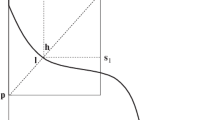Abstract
Two challenging issues for future wireless communication systems are the support of Quality of Service (QoS) and the definition of flexible access schemes to be used in heterogeneous systems (public cellular systems, wireless local area and ad-hoc networks). This paper deals with the class of Radio Resource Control (RRC) based on power regulation, where typical PHY layers parameters (powers, interference, etc.) are combined with upper layers ones to i) increase radio channel utilization; ii) perform admission control of heterogeneous wireless links; iii) maintain negotiated QoS levels expressed as a function of the Signal-to-Interference-Ratio (SIR). In the recent literature power control is mainly employed to dynamically adapt the transmission of concurrent links to the varying system conditions (due to channel quality, mobility) still guaranteeing the perceived QoS. In this framework, we investigate how the design of a suitable power control can be used in the support of traffic requiring some QoS guarantees. The paper presents a paradigm where all the RRC operations are performed in a distributed way, i.e., independently for each link involved in a communication. The distributed approach assures that the strategies are quite flexible to be used both in cellular-like systems and in ad-hoc networks.
Chapter PDF
Similar content being viewed by others
Keywords
These keywords were added by machine and not by the authors. This process is experimental and the keywords may be updated as the learning algorithm improves.
References
Rappaport, T.S., Annamalai, A., Buehrer, R.M., Tranter, W.H.: Wireless communications: past events and a future perspective. IEEE Communications Magazine 40(5), 148–161 (2002)
Chandra, A., Gummalla, V., Limb, J.O.: Wireless Medium Access Control Protocols. IEEE Communications Surveys, Second quarter 2000, 2–15 (2000)
Bambos, N., Kandukury, S.: Power-controlled multiple access schemes for next generation wireless packet networks. IEEE Wireless Communications, 58–64 (June 2002)
Kim, D.: Rate-Regulated Power Control for Supporting Flexible Transmission in Future CDMA Mobile Networks. IEEE J. Select. Areas Commun. 17(5), 968–977 (1999)
Novakovic, D.M., Dukic, M.L.: Evolution of the Power Control Techniques fo DS-CDMA toward 3G Wireless Communication Systems. IEEE Communications Surveys, 2–15 (Fourth Quarter 2000)
Xiao, M., Shroff, N.B., Chong, E.K.P.: Distributed Admission Control for Power- Controlled Cellular Wireless Systems. IEEE/ACM Transactions on Networking 9(6), 790–800 (2001)
Monks, J.P., Bharghavan, V., Hwu, W.W.: A Power Controlled Multiple Access Protocol for Wireless Packet Networks. In: Proc. INFOCOM 2001, pp. 219–228 (2001)
Bambos, N., Chen, S.C.: Channel Access Algorithms with Active Link Protection for Wireless Communication Networks with Power Control. IEEE/ACM Trans. On Networking 8(5), 583–597 (2000)
Martello, C., Bocchetta, D.: Power Controlled MAC Protocols for Wireless Ad-Hoc Networks. In: Proc. of European Wireless 2002, February 2002, pp. 319–326 (2002)
Zhu, C., Corson, M.S.: A Distributed Channel Probing Scheme for Wireless Networks. In: IEEE INFOCOM 2001, pp. 403–411 (2001)
Lal, S., Sousa, E.S.: Distributed Resource Allocation for DS-CDMA-Based Multimedia ad hoc Wireless LAN’s. IEEE J. Select. Areas Commun. 17(5), 947–967 (1999)
Wu, S.L., Tseng, Y.C., Sheu, J.P.: Intelligent Medium Access for Mobile Ad-hoc Networks with Busy Tones and Power Control. IEEE J. Select. Areas Commun. 18(9), 1647–1657 (2000)
Author information
Authors and Affiliations
Editor information
Editors and Affiliations
Rights and permissions
Copyright information
© 2003 Springer-Verlag Berlin Heidelberg
About this paper
Cite this paper
Cuomo, F., Martello, C. (2003). Improving Wireless Access Control Schemes via Adaptive Power Regulation. In: Conti, M., Giordano, S., Gregori, E., Olariu, S. (eds) Personal Wireless Communications. PWC 2003. Lecture Notes in Computer Science, vol 2775. Springer, Berlin, Heidelberg. https://doi.org/10.1007/978-3-540-39867-7_10
Download citation
DOI: https://doi.org/10.1007/978-3-540-39867-7_10
Publisher Name: Springer, Berlin, Heidelberg
Print ISBN: 978-3-540-20123-6
Online ISBN: 978-3-540-39867-7
eBook Packages: Springer Book Archive




